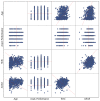Self-Care and Sense of Coherence: A Salutogenic Model for Health and Care in Nursing Education
- PMID: 35954838
- PMCID: PMC9368734
- DOI: 10.3390/ijerph19159482
Self-Care and Sense of Coherence: A Salutogenic Model for Health and Care in Nursing Education
Abstract
Background: Effective advocacy on self-care and the enhancement of a sense of coherence among nurses don't only benefit control over one's health and personal performance, but it may have a direct impact on clinical care and on the entire healing system. In this regard, nursing curricula grounded on a salutogenic model of health (SMH) operate with strategies to engage students in self-care and contribute to improving their mental health and wellbeing. The aim of this study was to explore the relationships between self-care agency and a sense of coherence as dependent variables and the age and self-reported academic performance as independent variables in nursing assistant students.
Methods: For this cross-sectional study, data were collected from a full sample of 921 Certified Nursing Assistant (CNA) Spanish students. A self-administered questionnaire, including sociodemographic variables, the 'appraisal of self-care agency' (ASA), and the 'sense of coherence' (SOC) constructs, was administered.
Results: Older participants presented significantly stronger values of both constructs. Apart from a significant and positive correlation between ASAS and SOC, ANOVA analyses indicate significant differences in terms of academic performance according to different ASAS and SOC degrees.
Conclusions: The findings of this study endorse the assumption that there is a consistent relationship between ASA and SOC constructs that might, indeed, have a potential effect on students' academic performance. In practical terms, it seems relevant to try to recognise the students' self-care agency and the sense of coherence as forceful predictive variables of mental health and wellbeing, in addition to academic success as a strength implied in the future career achievement.
Keywords: certified nursing assistant; mental health; nurse; salutogenic model of health; self-care; sense of coherence; students.
Conflict of interest statement
The authors declare no conflict of interest.
Figures
Similar articles
-
Sense of coherence, academic performance and professional vocation in Certified Nursing Assistant students.Nurse Educ Today. 2019 Aug;79:8-13. doi: 10.1016/j.nedt.2019.05.004. Epub 2019 May 6. Nurse Educ Today. 2019. PMID: 31078870
-
Self-care appraisal in nursing assistant students: Adaptation, validation and psychometric properties of the Spanish ASAS.PLoS One. 2021 Dec 8;16(12):e0260827. doi: 10.1371/journal.pone.0260827. eCollection 2021. PLoS One. 2021. PMID: 34879084 Free PMC article.
-
Health Assets, Vocation and Zest for Healthcare work. A Salutogenic Approach to Active Coping among Certified Nursing Assistant Students.Int J Environ Res Public Health. 2020 May 20;17(10):3586. doi: 10.3390/ijerph17103586. Int J Environ Res Public Health. 2020. PMID: 32443778 Free PMC article.
-
Sense of Coherence in Nurses: A Systematic Review.Int J Environ Res Public Health. 2020 Mar 13;17(6):1861. doi: 10.3390/ijerph17061861. Int J Environ Res Public Health. 2020. PMID: 32183042 Free PMC article.
-
The relationship between sense of coherence and emotional intelligence as individual health assets for mental health promotion in students and healthcare professionals: a scoping review.Front Public Health. 2024 Feb 20;12:1304310. doi: 10.3389/fpubh.2024.1304310. eCollection 2024. Front Public Health. 2024. PMID: 38450140 Free PMC article.
Cited by
-
Latent profile analysis of sense of coherence and relationship with meaning of life and professional identity among nursing undergraduate.BMC Nurs. 2025 Jan 23;24(1):82. doi: 10.1186/s12912-024-02564-x. BMC Nurs. 2025. PMID: 39849431 Free PMC article.
-
Sense of Coherence or resilience as predictors of psychological distress in nursing students during the COVID-19 pandemic.Front Public Health. 2023 Aug 17;11:1233298. doi: 10.3389/fpubh.2023.1233298. eCollection 2023. Front Public Health. 2023. PMID: 37663830 Free PMC article.
-
The relationship between burnout, sense of coherence and job safety attitudes among nurses after coronavirus disease 2019 in China: a cross-sectional survey.Front Public Health. 2025 Feb 19;13:1516744. doi: 10.3389/fpubh.2025.1516744. eCollection 2025. Front Public Health. 2025. PMID: 40046128 Free PMC article.
-
Outcomes of a Risk-Stratified Protocol for Preventing Peristomal Skin Complications in Patients with an Ostomy: A Cohort Study.Nurs Rep. 2025 May 20;15(5):179. doi: 10.3390/nursrep15050179. Nurs Rep. 2025. PMID: 40423212 Free PMC article.
-
A Pilot Feasibility Evaluation of a Heart Rate Variability Biofeedback App to Improve Self-Care in COVID-19 Healthcare Workers.Appl Psychophysiol Biofeedback. 2024 Jun;49(2):241-259. doi: 10.1007/s10484-024-09621-w. Appl Psychophysiol Biofeedback. 2024. PMID: 38502516 Free PMC article.
References
-
- Brady T.J., Murphy L., O’Colmain B.J., Beauchesne D., Daniels B., Greenberg M., House M., Chervin D. Peer reviewed: A meta-analysis of health status, health behaviors, and health care utilization outcomes of the chronic disease self-management program. Prev. Chronic Dis. 2013;10:E07. doi: 10.5888/pcd10.120112. - DOI - PMC - PubMed
-
- World Health Organization . Self-Care in the Context of Primary Health Care (No. SEA-HSD-320) WHO Regional Office for South-East Asia; New Delhi, India: 2009.
MeSH terms
LinkOut - more resources
Full Text Sources


